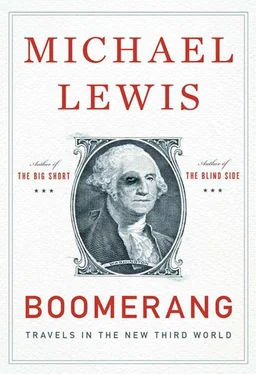That changed on October 4, 2009, when the Greek government turned over. A scandal felled the government of Prime Minister Kostas Karamanlis and sent him packing, which perhaps is not surprising. What’s surprising was the nature of the scandal. In late 2008, news broke that Vatopaidi had somehow acquired a fairly worthless lake and swapped it for far more valuable government-owned land. How the monks did this was unclear—paid some enormous bribe to some government official, it was assumed. No bribe could be found, however. It didn’t matter: the furor that followed drove Greek politics for the next year. The Vatopaidi scandal registered in Greek public opinion like nothing in memory. “We’ve never seen a movement in the polls like we saw after the scandal broke,” the editor of one of Greece’s leading newspapers told me. “Without Vatopaidi, Karamanlis is still the prime minister, and everything is still going on as it was before.” Dimitri Contominas, the billionaire creator of a Greek life-insurance company and, as it happens, owner of the TV station that broke the Vatopaidi scandal, put it to me more bluntly: “The Vatopaidi monks brought George Papandreou to power.”
After the new party (the supposedly socialist Pasok) replaced the old party (the supposedly conservative New Democracy), it found so much less money in the government’s coffers than it had expected that it decided there was no choice but to come clean. The prime minister announced that Greece’s budget deficits had been badly understated—and that it was going to take some time to nail down the numbers. Pension funds and global bond funds and other sorts who buy Greek bonds, having seen several big American and British banks go belly-up, and knowing the fragile state of a lot of European banks, panicked. The new, higher interest rates Greece was forced to pay left the country—which needed to borrow vast sums to fund its operations—more or less bankrupt. In came the IMF to examine the Greek books more closely; out went whatever tiny shred of credibility the Greeks had left. “How in the hell is it possible for a member of the euro area to say the deficit was 3 percent of GDP when it was really 15 percent?” a senior IMF official asks. “How could you possibly do something like that?”
Just now the global financial system is consumed with the question of whether the Greeks will default on their debts. At times it seems as if it is the only question that matters, for if Greece walks away from $400 billion in debt, then the European banks that lent the money will go down, and other countries now flirting with bankruptcy (Spain, Portugal) might easily follow. But this question of whether Greece will repay its debts is really a question of whether Greece will change its culture, and that will happen only if Greeks want to change. I am told fifty times if I am told once that what Greeks care about is “justice,” and what really boils the Greek blood is the feeling of unfairness. Obviously this distinguishes them from no human being on the planet, and ignores what’s interesting: exactly what a Greek finds unfair. It’s clearly not the corruption of their political system. It’s not cheating on their taxes, or taking small bribes in their service to the state. No: what bothers them is when some outside party—someone clearly different from themselves, with motives apart from narrow and easily understood self-interest—comes in and exploits the corruption of their system. Enter the monks.
Among the first moves made by the new minister of finance was to file a lawsuit against the Vatopaidi monastery, demanding the return of government property and damages. Among the first acts of the new parliament was to open a second investigation of the Vatopaidi affair, to finally nail down exactly how the monks got their sweet deal. The one public official who has been strung up—he’s had his passport taken away and remains free only because he posted a bail of 400,000 euros—is an assistant to the former prime minister, Giannis Angelou, who stands accused of helping these monks.
In a society that has endured something like total moral collapse, its monks had somehow become the single universally acceptable target of moral outrage. Every right-thinking Greek citizen is still furious with them and those who helped them, and yet no one knows exactly what they did, or why.
FATHER ARSENIOS LOOKS to be in his late fifties—though who knows, as their beards cause them all to look twenty years older. He’s about as famous as you can get, for a monk: everyone in Athens knows who he is. Mr. Inside, the consummate number two, the CFO, the real brains of the operation. “If they put Arsenios in charge of the government real-estate portfolio,” a prominent Greek real estate agent said to me, “this country would be Dubai . Before the crisis.” If you are kindly disposed to these monks, Father Arsenios is the trusted assistant who makes possible the miraculous abbacy of Father Ephraim. If you are not, he’s Jeff Skilling to Ephraim’s Kenneth Lay.
I tell him who I am and what I do—and also that I have spent the past few days interviewing political types in Athens. He smiles, genuinely: he’s pleased I’ve come! “The politicians all used to come here,” he says, “but because of our scandal they don’t now. They are afraid of being seen with us!”
He escorts me into the dining hall and plants me at what appears to be the pilgrim’s table of honor, right next to the table filled with the top monks. Father Ephraim heads that table, with Arsenios in shouting distance.
Most of what the monks eat they grow themselves within a short walk of the dining hall. Crude silver bowls contain raw, uncut onions, green beans, cucumbers, tomatoes, and beets. Another bowl holds bread baked by the monks, from their own wheat. There’s a pitcher of water and, for dessert, a soupy orange sherbet-like substance and dark honeycomb recently plundered from some beehive. And that’s pretty much it. If it were a restaurant in Berkeley, people would revel in the glorious self-righteousness of eating the locally grown; here the food just seems plain. The monks eat like fashion models before a shoot. Twice a day four days a week, and once a day for three: eleven meals, all of them more or less like this. Which raises an obvious question: Why are some of them fat? Most of them—maybe 100 out of the 110 now in residence—resemble their diet. Beyond thin: narrow . But a handful, including the two bosses, have an ampleness to them that cannot be explained by eleven helpings of raw onion and cucumber, no matter how much honeycomb they chew through.
After dinner the monks return to church, where they will remain chanting and singing and crossing and spraying incense until one in the morning. Arsenios grabs me and takes me for a walk. We pass Byzantine chapels and climb Byzantine stairs until we arrive at a door in a long Byzantine hall freshly painted but otherwise antique: his office. On the desk are two computers; behind it a brand-new fax machine-cum-printer; on top of it a cell phone and a Costco-size tub of vitamin C pills. The walls and floor gleam like new. The cabinets exhibit row upon row of three-ring binders. The only sign that this isn’t a business office circa 2010 is a single icon over the desk. Apart from that, if you put this office side by side with the office of Greece’s minister of finance and asked which one housed the monk, this wouldn’t be it.
“There is more of a spiritual thirst today,” he says, when I ask him why his monastery has attracted so many important business and political people. “Twenty or thirty years ago they taught that science will solve all problems. There are so many material things and they are not satisfying. People have gotten tired of material pleasures. Of material things. And they realize they cannot really find success in these things.” And with that he picks up the phone and orders drinks and dessert. Moments later a silver tray arrives, bearing pastries and glasses of what appears to be crème de menthe.
Читать дальше












